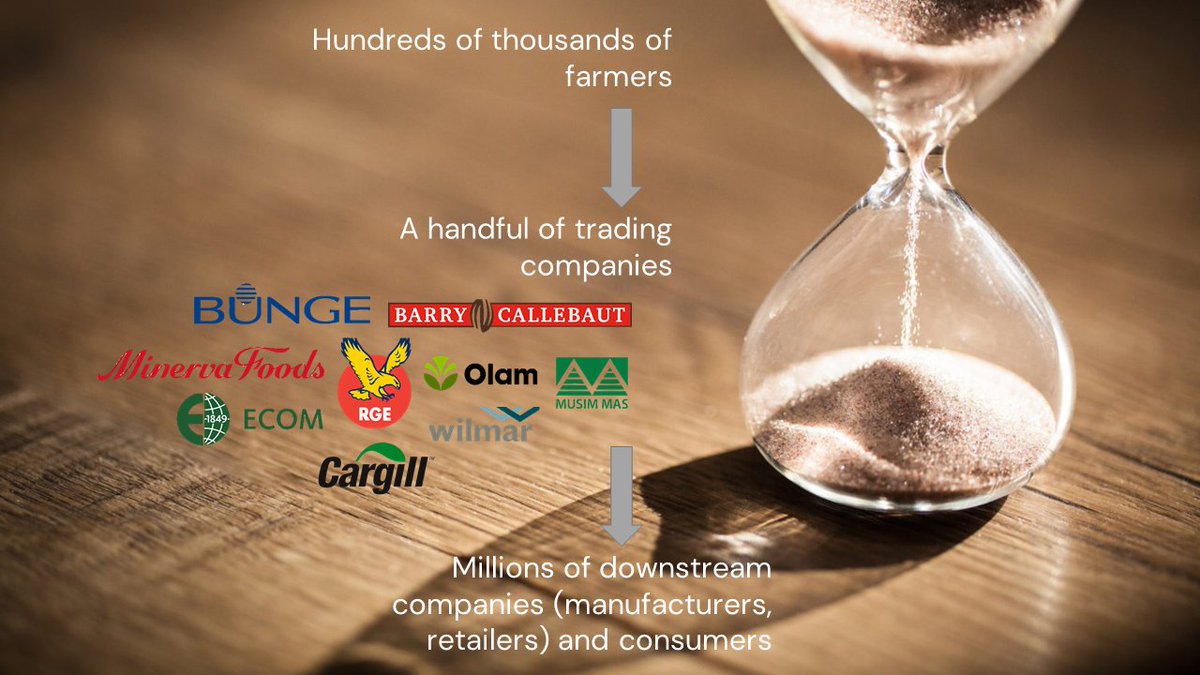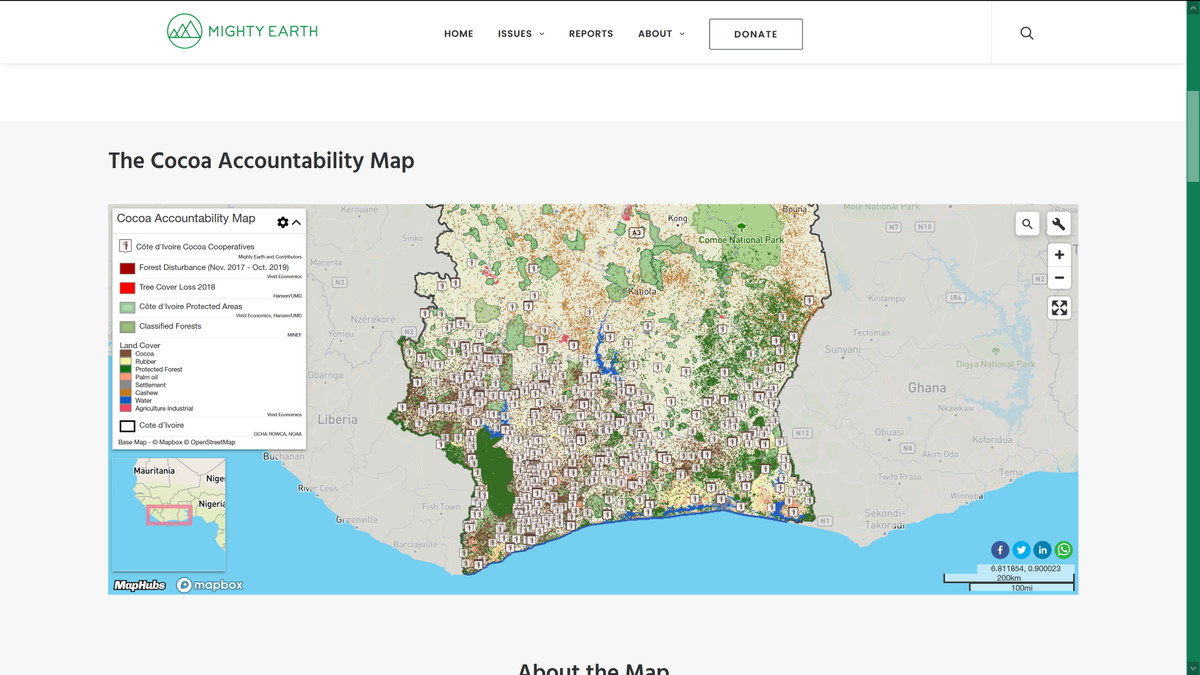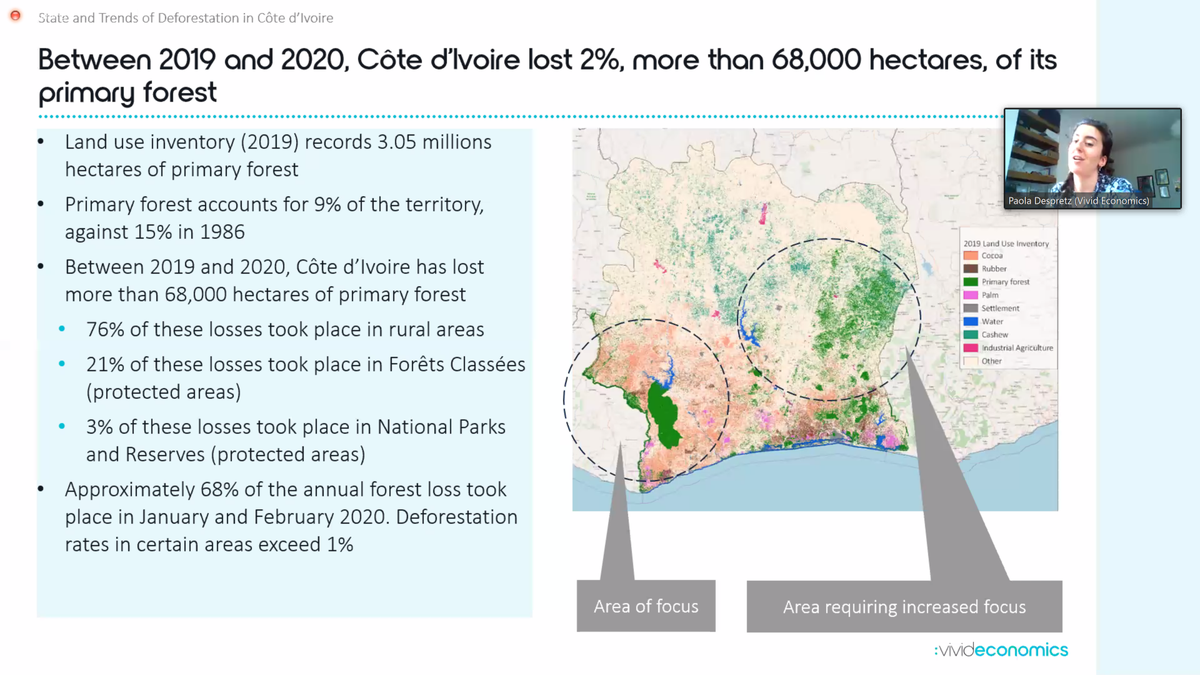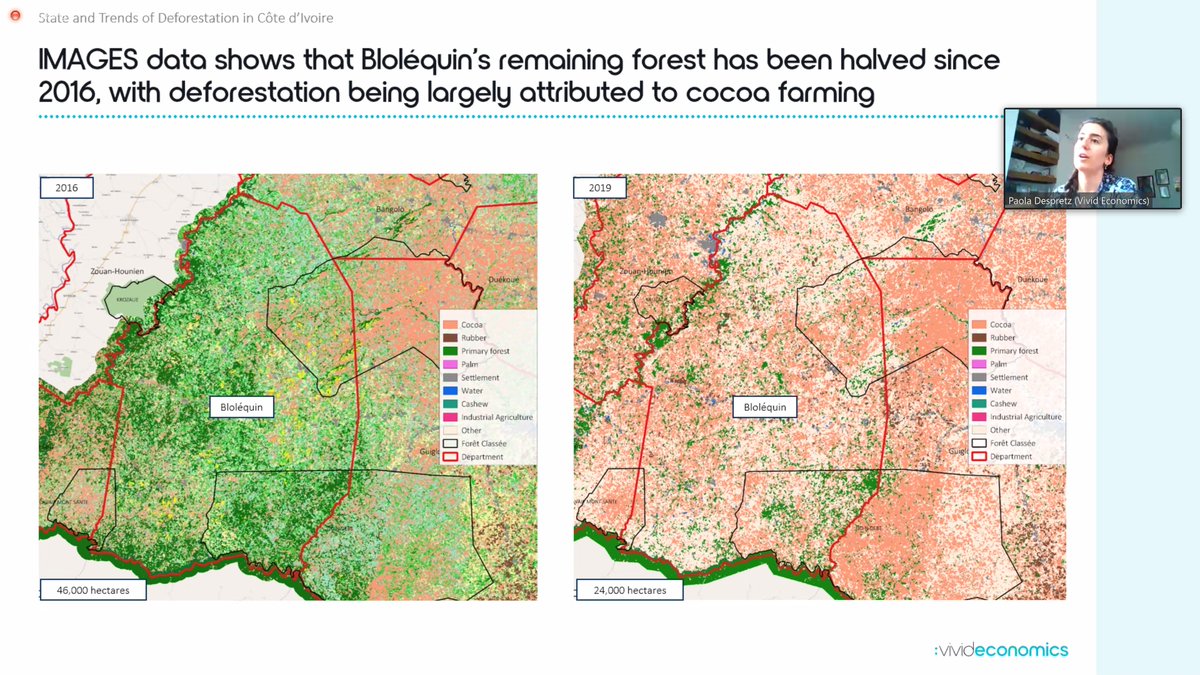
🎺Hot off the press🎺
New research @IOPenvironment on the deforestation hidden in the Côte d’Ivoire #cocoa supply chain, source of 40% of the world’s 🍫.
Four key take-aways. 🧵
New research @IOPenvironment on the deforestation hidden in the Côte d’Ivoire #cocoa supply chain, source of 40% of the world’s 🍫.
Four key take-aways. 🧵

1.Cocoa is a major driver of deforestation. Building on a new high-resolution, high-accuracy cocoa map, we identify 2.5 Mha of cocoa deforestation and degradation from 2000-2019, making cocoa responsible for 46% of the total deforestation and forest degradation in the country. 

“Cocoa deforestation” being the loss of undisturbed tropical moist forest to cocoa & “cocoa degradation” where cocoa overlapped areas which underwent a change from undisturbed -> degraded forest. (Cocoa is a tree crop, blurring the traditional notions of 'deforestation'...)
2.Cocoa trading is consolidated: In 2019, 8 traders (Cargill, Barry Callebaut, Olam, Touton, Sucden, S3C, ECOM, & Africa Sourcing) handled ⅔ of exports. We mapped direct sourcing from cooperatives & indirect sourcing from local intermediaries, as best we could using public data 

3.The sector is struggling with traceability.
Companies have been talking about deforestation, child labour, farmer incomes, etc, for more than a decade, but we still don’t know much of the cocoa they source comes from, nor what their impact is. 🤷
Companies have been talking about deforestation, child labour, farmer incomes, etc, for more than a decade, but we still don’t know much of the cocoa they source comes from, nor what their impact is. 🤷
Only 44% of exports can be traced back to specific cooperatives. The majority of cocoa (55%) remains untraced, either indirectly sourced from local intermediaries by major traders (24%) or exported by traders who disclose no information about their suppliers (32%).
Companies face an uphill climb to meet new EU #DueDiligence legislation’s requirement for farm-level traceability.
We estimate that traders in the Cocoa and Forests Initiative (CFI) have mapped 40% of the farms supplying them, representing only 22% of all Ivorian cocoa exports.
We estimate that traders in the Cocoa and Forests Initiative (CFI) have mapped 40% of the farms supplying them, representing only 22% of all Ivorian cocoa exports.

Note: in their CFI progress reports @WorldCocoa ignores ‘indirect sourcing’, even though it makes up about half of all cocoa in the country.
To tackle the challenge, a lot of expectation is being placed on new national-level traceability systems 🤞
https://twitter.com/erasmuszu/status/1552573576103985153?s=20&t=-OeziQwB4FhtoQn4wE_w5g
To tackle the challenge, a lot of expectation is being placed on new national-level traceability systems 🤞
4.Current Corporate Social Responsibility (CSR) approaches are somewhat divorced from reality.
Certification schemes (UTZ/Rainforest Alliance/Fairtrade) & company sustainability programs (e.g. Mondelez’s Cocoa Life) rely on mass-balance systems to market ‘sustainable’ cocoa…
Certification schemes (UTZ/Rainforest Alliance/Fairtrade) & company sustainability programs (e.g. Mondelez’s Cocoa Life) rely on mass-balance systems to market ‘sustainable’ cocoa…
But certification has a mixed performance & mass-balance means that cocoa from certified & uncertified origins are mixed, with companies relying on paper-credits (not dissimilar to offsets).
So while in Germany >70% of chocolate is sold as certified, by mapping physical flows (rather than paper credits), we identify 108,000 ha of deforestation embedded in their 2019 imports.
There’s a lot of duplication of effort – with many cooperatives being double or triple certified and companies frequently buying from the same landscapes, but rarely collaborating to tackle issues systemically.
More landscape & systems-thinking needed.
More landscape & systems-thinking needed.

The full article is here: iopscience.iop.org/article/10.108…
And a blog explainer in English here: insights.trase.earth/insights/cocoa…
And in French here: insights.trase.earth/insights/les-e…
And the data are searchable at trase.earth
And a blog explainer in English here: insights.trase.earth/insights/cocoa…
And in French here: insights.trase.earth/insights/les-e…
And the data are searchable at trase.earth
This was a team effort, with the data masterfully pulled together by Cécile Renier & Mathil Vandromme, plus inputs from the rest of the team: @PMeyfroidt, @TraseEarth, and @ETH.
Here, we focused on deforestation, as a major concern for global climate & biodiversity. But that’s just one of many sustainability & equity issues in the 🍫 sector.
If you want to dig deeper, the @VoiceCocoa Barometer is a great place to start: cocoabarometer.org/wp-content/upl…
If you want to dig deeper, the @VoiceCocoa Barometer is a great place to start: cocoabarometer.org/wp-content/upl…
Ups, I missed spatial-data-guru & co-author @vivihrbr here! 🙏
• • •
Missing some Tweet in this thread? You can try to
force a refresh








